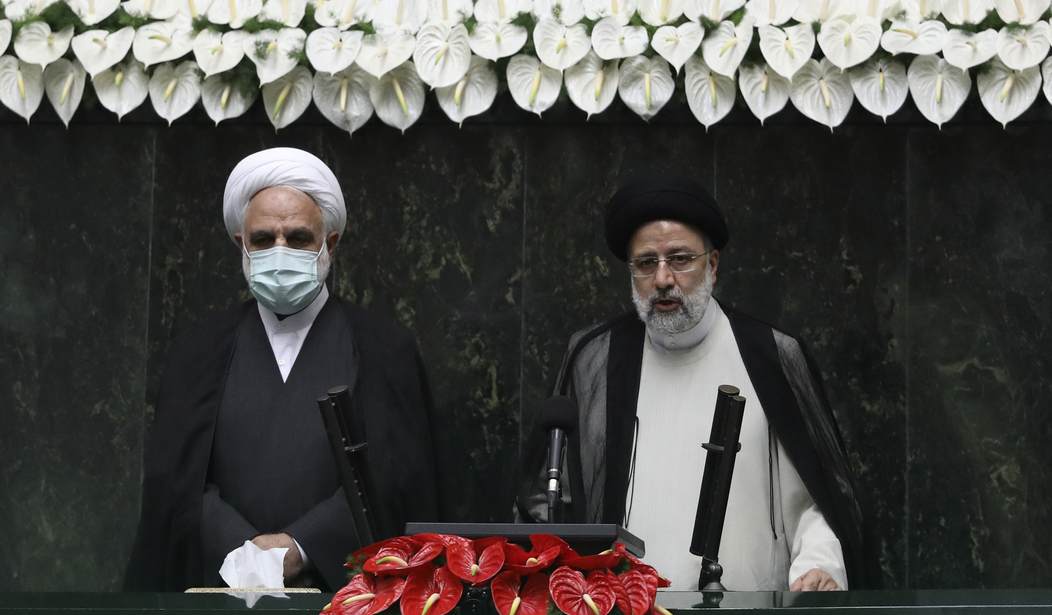Iranian negotiating team adviser Mohammad Marandi said on Monday that “we’re closer than we’ve been before” to concluding a nuclear agreement that wouldn’t prevent Iran from building a nuclear weapon but would give Tehran billions of dollars to spend on modernizing and expanding their military to threaten U.S. allies in the region.
I should probably mention that Joe Biden thinks signing an agreement with the terrorists will give him a political boost.
It’s all smoke and mirrors at this point. Iran has stockpiled uranium enriched to a 60% level — a level not needed for power generation, research, or any other purpose except to put the terrorists within a hair’s breadth of making 90% bomb-grade enriched uranium. And with its sophisticated centrifuge machines, Iran can spin up enough nuclear fuel for two or three bombs in a matter of days.
But since this is an agreement with Iran and not a treaty, Biden won’t need Senate approval to ratify it. Good thing too, from his perspective, since there isn’t even a Senate majority to get it approved anyway, much less a two-thirds majority that’s required for treaty approval.
But Biden and his administration are perfectly willing to pretend that the deal will restrain Iran from making a nuclear weapon. They know it won’t. They know it can’t. But by signing a deal with Iran, Biden will avoid being forced to make good on his promise to keep Iran from getting the bomb.
Biden made that promise after his meeting with Israeli Prime Minister Yair Lapid in July. “We will not — let me say it again — we will not allow Iran to acquire a nuclear weapon.”
But what if Iran builds a bomb and never gives Biden the proof that it exists? One of the most daring intelligence operations by any service in recent memory was Mossad’s 2018 raid on a warehouse in Tehran that resulted in the retrieval of tens of thousands of documents relating to Iran’s nuclear program.
The documents showed that Iran had an extensive computer modeling program which made a live-fire test of a nuclear device virtually unnecessary. Meanwhile, Biden has a ready-made excuse not to attack because of the lack of “proof” that Iran possesses a nuclear weapon.
Israel won’t quibble with details like that. If intel informs the Israelis that Iran is close to going nuclear, it’s likely they will do their best to eradicate the threat.
Still, it’s a good question to ask the president: what has caused this sudden optimism from Iran on signing a deal? What has he conceded to Iran that makes the deal closer than it has been?
On the surface, there are supposedly three sticking points.
Three main sticking points remain. Iran wants the Biden administration to remove its Islamic Revolutionary Guard Corps from its designated terrorist list, which so far Washington seems unwilling to do.
It also wants a guarantee that the deal will be binding regardless of future U.S. administrations. Biden cannot legally guarantee that, and the reality remains that another administration could cancel any deal just as former president Donald Trump did.
The third item is a long-running investigation by the IAEA into traces of uranium found at three of Iran’s undeclared nuclear sites several years ago. Tehran wants it shut down, something the agency itself, as well as Western governments, are opposed to.
Iran knows that each of those conditions will never be dropped, although it may still wring concessions on the IAEA investigation into trace uranium found at the Fodow research facility and Parchin military base. The EU is willing to modify its demands for transparency in exchange for Iran’s signature.
Eventually, there will be a “drop dead date” for Iran, and it’ll sign something. It’s meaningless anyway because, as Iran did with the 2015 nuclear agreement, it will interpret the agreement as it sees fit and dare the U.S. to declare its non-compliance.
As long as Biden is president, that won’t happen. Biden and the media will trumpet this agreement as a BFD and list it as an accomplishment.
But we might ask: if it’s such a big deal, why isn’t Biden proudly presenting it to the Senate for ratification?










